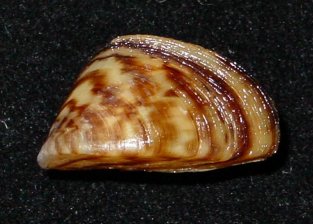The Minnesota Department of Natural Resources has confirmed a report of zebra mussels in Lake Pulaski in the city of Buffalo, Wright County.
A lake service-provider business reported finding a dead zebra mussel on equipment they were installing on a lake property for the season. Commercial divers subsequently found a live adult zebra mussel in the water at the same location. DNR staff will work with the lake improvement district on next steps.
The DNR reminds boaters and lake property owners to check boats and trailers, docks and boat lifts, and all other water-related equipment for invasive species when installing and removing equipment each year. Several new zebra mussel confirmations in recent years were initially reported by people removing these items.
Minnesota law requires that docks and lifts remain out of the water for at least 21 days after removal from a waterbody before they can be placed into another body of water. In addition, anyone who transports a dock or lift from a shoreline property to another location for storage or repair may need a permit (link is external) to help prevent the spread of aquatic invasive species.
Whether or not a lake is listed for any invasive species, Minnesota law requires boaters and anglers to:
- Clean watercraft and trailers of aquatic plants and prohibited invasive species.
- Drain all water by removing drain plugs and keeping them out during transport.
- Dispose of unwanted bait in the trash.
Some invasive species are small and difficult to see at the access. To remove or kill them, take one or more of the following precautions before moving to another waterbody:
- Spray with high-pressure water.
- Rinse with very hot water (120 degrees for at least two minutes or 140 degrees for at least 10 seconds).
- Dry for at least five days.
Zebra mussels can compete with native species for food and habitat, cut the feet of swimmers, reduce the performance of boat motors, and cause expensive damage to water intake pipes.
People should contact an area DNR aquatic invasive species specialist if they think they have found zebra mussels or any other invasive species that has not already been confirmed in a lake.
More information is available on the Aquatic Invasive Species page of the DNR website.